CurtainUp In the Berkshires
Barrington Stage Summer 2010 Season
By Elyse Sommer
Main Stage Show Reviews: Absurd Person Singular | Art | Sweeney Todd
Stage 2 Show Reviews: The Memory Show | Pool Boy | The Whipping Man| Freud's Last Session|
A Look at Barrington Stage's Youth Theater
Barrington Stage
Union Street, Pittsfield
413 236-8888
http://www.barringtonstageco.org Second Stage at the Veterans of Foreign Wars on Linden Street in Pittsfield, near the company's main venue on Union Street.
A Look At Barrington Stage's Youth Theater
In addition to bringing terrific theater and musicals to Berkshirites, Barrington Stage has been a vibrant presence in the community. With the help of a loyal following and the huge success of its launch of The 25th Annual Putnam County Spelling Bee, the company acquired its own permanent home in Pittsfield to make longer seasons possible. In addition to its beautiful Main Stage on Union Street, it has enjoyed great success in its Second Stage on Linden Street. Not to be overlooked is the annual Youth Theatre which gives local youths a chance to participate in a musical helmed by a professional director. Unlike many such community productions casting is not just done by a random selection of local high school students, but adheres to the same professional standards as those of their Main Stage. The actors theater goers eventually seen have all had to audition. Alo unique to this program, while student-participants usually pay to be part of such programs, th 35-performance 5-week run which extends the educational and professional value of the experience.
This year's production of Stephen Sondheim's Into the Woods, is the Youth Theatre's most challenging undertaking since its 1999 launch. It's also aptly connected to the theater community's celebration of Sondheim's 80th birthday, including Barrington's Main Stage season launch with its superb revival of Sondheim's masterpiece, Sweeney Todd. Sondheim musicals are darker and more complex than past Youth Theatre productions like Grease, You're a Good Man Charlie Brown and High School Musical. While these shows are not open to review, I can tell you this much about the show after seeing it during its initial run in the theater space carved out from the gym of St. Joseph's High Schol in Pittsfeld: The large talented cast of young thespians have fearlessly taken on this Sondheimian fairy tale and done honor to the the music and lyrics even though the accompaniment is limited to a single piano band. As usual with this musical, it seemed finished after its longer happily ever after first act finale (According to a comment in Meryel Secrest's excellent Sondheim biography by Chip Zien, the original baker, the first act felt so satisfyingly finished that audiences at the pre-Broadway run in San Diego tended to head for the parking lot and Zien heard Sondheim tell people to go back, that the show wasn't over).
Given the darker turn taken in the second act and that this stretched the performance to a total of three hours, I wondered if some of the very young children in this largely family audience would cry or get restless. But no worries -- all the talk about short attention spans notwithstanding, except for laughter at some of the funny spots there wasn't a peep or a fidget from the many very young and older kids or their parents (I sat next to the delightful Little Red Riding Hood's justly proud father) and grandparents. For more details about the plot and the song list, see my review of the 2002 Broadway run here. (A bit of trivia about that production: The actor seen only as the Milky-White puppet in that production is currently very visible as the star of the award winning musical Memphis and Stephen DeRosa, the Baker of that production, can be seen in the Berkshire Theatre Festival's Macbeth.
The Youth Theater production is directed and choreographed by Christine O'Grady, with musical direction by Chase Cooper with a simple but handsome set by Jarrod Bray, impressively luscious and finely detailed costumes by Karin Mason and some wonderful puppets by Huntger Kaczorowski
Cast: Rachel Ansell, John Besaw,Schuyler Briggs, Liam Callaghan, Lindsay Dewinkeleer, Rachel Hambro, Dylan LeSage, Chelsea LeSage, Austin Lombardi, Evelyn Mahon, Natalie Michaels, Cody Miller, Alice Murphy, Corey Potter, McKenna Powell, Julia Ray, Natalie Sala, Sophia Santore
After the July 14, 2010 - August 15, 2010 run the show moves to Pete's Motors in Great Barrington from August 11~15 New this year! Into the Woods in South County. Performances are Performances: Tuesday through Sunday at 7pm; Thursday, Saturday and Sunday at 2pm. Great Barrington: Additional performance on Wed., August 11 at 1pm.
|
Memories wander off. Memories roam. I can't give you your memories. So I'll give you what I can: I'll give you a home. — from "Lullabye," sung by the Daughter |
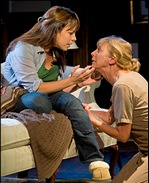
Leslie Kritzer and Catherine Cox
(Photo: Kevin Sprague) |
Given that Next to Normal (review), a musical about a family struggling with bi-polar disease won a Pulitzer Prize and is still running on Broadway as it embarks on a national tour, it's easy to see why Barrington Stage's Musical Lab has given The Memory Show a handsomely staged showcase with two well-credentialed performers — especially the terrific Leslie Kritzer as the daughter unhappily taking responsibility for a mother who was difficult even before she was diagnosed with early Alzheimer's.
While Sara Cooper has written some very smart lyrics, Zach Redler's score is more on the order of the classic world's new music than the rock opera style of Next to Normal's composer Tom Kitt. As orchestrated for a single piano its tendencies towards repetition are somehow exacerbated, while the lushness that an audience could get lost in even with just a few more instruments is missing.
The book too isn't quite ready to be evaluated as other than a work in progress. It is too apparent that the most deep-seated emotional situation is forged from second-hand rather than first-hand experience (Ms. Cooper did have a grandmother who suffered from Alzheimer's but it was her mother who was the one who had the direct dealing with and responsibility). Kenneth Lonergan' s play Waverly Gallery (review) which started life in the Berkshires had a grandson at the center of his grandmother's decline through Alzheimer's but the story was very much the grandson's since he ended up being more intimately involved than his parents.
While Daughter (Ms. Cooper has Albee-like kept her characters nameless) being single at age 31 is no doubt tied to her conflicted relationship with her mother, especially as it pertains to their different perceptions of the deceased father, the business about looking for a man ("Single Jewish Female Seeks Man") seems more sandwiched in than organic. So do the Jewish holiday references.
Much as I love big, old-fashioned musicals with happy endings and chockablock with insistently hummable tunes sung by colorfully costumed performers and lots of eye-popping choreography, I've always been an enthusiastic supporter of chamber musicals. Even though these smaller shows have left me with few, if any, songs with a high hummability quotient, quite a lot of them have been powerful enough to make it into my unforgettable musical memory book. A New Brain, review) a 1998 work by William Finn, the man who as Barrington Stage's Musical LAb Artistic Producer has been shepherding chamber musicals more often than not discovered in his NYU classes is a case in point. It had a relatively small cast and orchestra and was about a serious subject, Finn's own experience of surviving brain surgery. Finn's famous Marvin trilogy also fell within the chamber musical genre and subject matter not usually associated with escapist fare as musicals tended to be.
Besides more acceptance of serious-minded musicals, the economics of putting on a show have made producers more open anything that can be done with less than even the usually small chamber musical casts. Jason Robert Brown's music for The Last Five Years, (review), a two-hander about a failed marriage, has been heard in a lot more theaters than his score for his first and very big show, Parade. Of course the appeal of a musical that can be easily and economically mounted goes back to the still much revived I Do, I Do, the Tom Jones-Harvey Schmidt musical adaptation of The Four Poster. All this said, The Memory Play is a case of teacher William Finn wisely guiding Cooper and Redler to put aside their more ambitious idea for a much larger show on which to collaborate and focus on one with a better chance to have a life.
As I said earlier, The Memory Show could use more work before opening itself up to reviews. It's obvious that the songs are intended to represent the women's inner voices as their angry conversations point to the disconnect that has overhung their relationship for years, but those shifts need to be more organic.
Some of the songs like "Memory Like an Elephant" do support Cooper and Redler's objective of blending comedy and tragedy. "Single Jewish Female Seeks Man" needs more reason to be included "When My Mother Dies" teeters on the brink of bad taste.
Whatever the changes, Brian Prather's set is ready for prime time with its wonderful apartment hallway filled with family pictures interspersed with empty ones that are an apt metaphor for the memories Kritzer's Daughter wants to give back to her mother but can't.
Production Notes The Memory Show
Book and Lyrics by Sara Cooper
Music by Zach Redler
Directed by Joe Calarco
Starring Catherine Cox (Mother) and Leslie Kritzer (Daughter)
Musical Director/Pianist: Vadim Feichtner
Sound: Adair Mallory
Scenery: Brian Prather
Stage Manager: Michael Andrew Rodgers
Lighting:vJoel Shier
August 18 - 29, 2010
Tuesday through Friday at 7:30pm; Saturday at 4pm and 8pm; Sunday at 7:30pm
Reviewed by Elyse Sommer at August 22nd press opening
Pool Boy
| Everyone wants a little moment of sunshine. Everyone wants a little moment of fame. Everyone wants a little love and attention. Everyone wants a little more than a name. Something to own, something to claim. Everyone here is playing the game . —from " Little Piece of Sunshine." |
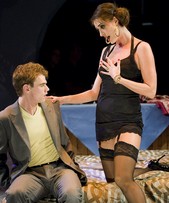
Sarah Gettlefinger and Jay Armstrong Johnson
(Photo: Kevin Sprague) |
But Lab is short for laboratory which means that these musicals are works in progress and several have moved on to productions elsewhere. Pool Boy, which launches this year's lab season surrounded by considerable hit-in-the-making buzz, needs some more swimming lessons to keep it afloat, let alone dive into the big hit waters.
That said, maybe this is a case of overdoing all the trial and error that's part of the lab process. Perhaps all the reworking (I hear things were being changed right up to a day before the official opening I attended) has robbed this piece of its initial buoyancy, making what's now on offer at Barrington's Second Stage more soggy than scintillating.
At any rate, the Lab's artistic producer William Finn may not have been wrong to encourage songwriter lyricist Nikos Tsakalakos to write a show based on his experience as a pool boy at the Bel-Air Hotel in Los Angeles. Unfortunately that initial premise has been developed into something too lab-orious (sorry, the pun is irresistible) to be the next Putnam County Spelling Bee (the little musical that helped to move Barrington Stage out of a high school auditorium to become one of Pittsfield's prime artistic enterprises). Except for an occasional winning duet like "Background" and "Little Piece of Sunshine," that sums up the story line, the music is too repetitive and the lyrics tend to be pedestrian. Tskalakos's collaboration with book writer Janet Allard hasn't helped to make the fictional versions of the people he provided with drinks and towels during his pool boy days less stereotypic — or at least the kind of stereotypes that you can like and enjoy watching.
The idea is basically that of a naif hero entering a world of conniving knaves. In this case the naif is an ambitious young musician-songwriter who's not unaware that talent will go unfulfilled without connections. This naif but eager hero of Tsakalakos's fictionalized poolside saga is unsurprisingly named Nick (as in Nikos) and he does meet a record mogul. But making a connection beyond fetching drinks and towels is a bit like making a pact with the devil — in this case making nice with the mogul's bored, sexually aggressive wife and heeding her advice (or at least trying) to let hubby beat him at tennis (in a nicely choreographed number titled, you guessed it, "Playing Tennis").
Even though the wife is played with plenty of sexual sizzle by a Broadway musical veteran Sara Gettelfinger, and the other six performers give the show everything they've got, nothing can make their characters move out of the shallow end of this pool. Jay Armstrong Johnson is an attractive, agile young performer but he hardly has the sort of appeal to arouse the a woman like Gettelfinger's sultry Donna Duval to bare her breasts (Caveat to parents: It's half-frontal nudity, but nudity nonetheless and the F-word is also used at least once). Other characters add a rather offensive racial flavor— for example, the hotel manager (Cliff Beams) who hides his Spanish identity by calling himself Lopes instead of Lopez and Nick's sidekick and adviser Jack (Jon Norman Schneider) who is not above playing an obsequious B-Movie Asian.
While the singing is generally fine — in some cases, like Cliff Beams' Lopes, and occasionally Courtney Wolfson's April, outstanding— the performers being miked in this tiny venue borders on the ridiculous. The miking robs audiences of the pleasure of hearing voices in their natural, "unplugged" state. In this setting it smacks of hubris, as if declaring " this is how we're going to do it in a big New York theater." To be fair, those ear mikes may be needed to avoid being drowned out by the three piece band (also miked?). The musicians play well but mre in competition with the singers than to accompany them.
The best thing about the current production is that director Daniella Topal and the designers have managed to create an attractive, versatile and authentic setting. Brian Prather uses a couple of scrim-like sliding panels to fluidly shift the scene from poolside to bedroom. Nicole Pearce's lighting adds terrific visual effects and Holly Cain's costumes, especially for Gettelfinger and Wolfson, are great fun. But it takes more than applause-worthy scenery and costumes, the occasional catchy song to make a good idea lab its way into good musical.
Production Notes
Pool Boy
Music and Lyrics by Nikos Tsakalakos
Book and Lyrics by Janet Allard
Musical Direction by Matt Castle
Choreography by Shonn Wiley
Directed by Daniella Topol
Cast: Cliff Bemis (Mr. Lopes), Sara Gettelfinger (Donna Duval), John Hickock (Rodney Duval), Jay Armstrong Johnson (Nick), Jon Norman Scheider (Jack), Sorab Wadia (The Sultan of Nubai), Cortney Wolfson (April)
Scenic Design: Brian Prather
Costume Design: Holly Cain
Lighting Design: Nicole Pearce
Sound Design: Brad Berridge
Production Stage Manager: Michael Andrew Rodgers
Musical Director and pianist: Matt Castle, Mike Petitry-Guitar, Nikos Tsaklakos -Cajon
July 13-August 8, 2010
Reviewed by Elyse Sommer at July 21st press opening
|
Musical Numbers
| |
Act One
|
Act Two
|
Absurd Person Singular
| My work is about men's inhumanity to women and women's inhumanity to men. It's also about the whole physical world's inhumanity to us all.—Alan Ayckbourn The pills. Not ill? — Sidney It depends on what you mean by ill, doesn't it?. If you mean do they prevent me from turning into a raving lunatic, the answer is probably yes.— Eva Raving lunatic, yes . . but then I always say, it helps to be a bit mad, doesn't it? I mean, we're all a bit mad. I'm a bit mad. . .Yes. It's a mad world, as they say.— Sidney |
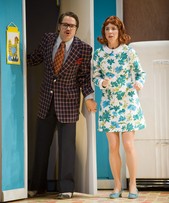
Robert Petkoff and Julia Coffey
(Photo: Kevin Sprague ) |
Though I missed Absurd Person Singular's successful 1974 Broadway debut, I was a devout Ayckbourn fan by the time it resurfaced on Broadway in 2005 under the auspices of Manhattan Theater Club. Unfortunately, despite an excellent cast, this production was disappointing in that it failed to strike the delicate balance needed to integrate the farcical humor and increasingly dour elements. Besides no longer being as socially relevant as it was some thirty years earlier, there was the fact that the prolific Ayckbourn had kept turning out scripts and it seemed to me that the Brit Festival at the 59E59Theater complex was doing more to please Ayckbourn's fans and make new ones by letting Ayckbourn's own theater company put on his terrific new play Private Fears In Public Places.
While both the Absurd. . . revival and Private Fears. . . had limited runs, Ayckbourn has enjoyed both a triumphant Broadway revival with a marathon production of The Norman Conquests and another Britfestival hit (also a marathon), Intimate Exchanges. Add to that a delightful new play, My Wonderful Day, and it's clear that Sir Alan's star has been shining strong and bright both on and Off-Broadway. It's therefore easy to see why Julianne Boyd would think this a good time to reconsider Absurd Person Singular.
As it turns out, not a bad idea at all— especiallty since Boyd has once again enlisted Jesse Berger to direct. He's the fellow who last year teased every possible laugh from a revival of Anthony Shaffer's Sleuth, imbued it with a wealth of authentic detail and even got the actors to bring out the underlying darkness. And he's done it again.
The production that just opened at Barrington's Main Stage is full of visual wit — from the Santa Claus, beribboned procenium that sets the tone for the three Christmases during which we get to know the play's six characters to the three kitchens where their hilarious and also harrowing get-togethers play out. Jo Winiarski's kitchens define each couple's social standing and are color-coordinated with the outfits which also establish the 1973-4-5 time frame.
Each member of the ensemble expertly navigates between farce and tragedy, and delivers the playwright's many funny lines as well as the cruel barbs with dexterity. The first act with its garish turqouise and white decor takes place in the home of the Hopcrafts — Jane (a delightfully ditzy Julia Coffey) and Sidney (a spot-on Robert Perkofft).
The over-the-top, ambitious real estate entrepreneur and his cleanliness obsessed wife's party is pretty much an out and out farce that often feels like a British sitcom. Jane amusingly attacks any speck of dirt as if it were a shotgun carrying arch-enemy and winds up drenched by a rainstorm and locked out of her own spotless kitchen. But she also allows Sidney to boss her about rather cruelly and it's these little cruelties that drive this comedy and keeps the sitcom comparisons at bay.
There are also early on hints of problems in the other marriages. Banker Ronald's (Graeme Malcom an on the mark old school Brit) chic and riotously insincere wife Marion (a wonderfully acerbic Henny Russell) is sufficiently interested in having enough liquor in her drink to hint at a potentially boozy decline. And architect Geoff (Barrngton stage favorite Christopher Innvar in a delectably horrible 70s wig) and his pill popping wife Eva (Finnerty Steeves) obviously don't have a marriage made in heaven. Were it not for business (Sidney wants a loan from the banker, Geoff wants the banker to recommend him to a builder, the banker wants both as steady depositors) it's unlikely that any of these people would ever be together to usher in the holiday.
The second and best act finds us in Eva and Geoff's kitchen. While the farcical elements continue to build, the joke this time is that Eva tries every which way to kill herself after Geoff has announced his intention to leave her — and nobody notices. This scene is a masterpiece of black comedy and fortunately Mr. Berger manages to have the actors balance the comic and tragic elements but smartly lets comedy win out as Ronald inadvertently rescues Eva but almost gets himself fatally electrocuted.
Unfortunately it's hard to top that second act and the third act in Ronald and Marion's kitchen is something of a letdown. This is partly because the political symbolism of the upper class couples losing their grip on the social order while nouveau rich Sidney and Jane now calling the shots in a game that's more macabre than merry has dimmed with time. If there were a fourth Christmas forwarding to 2011, they'd all be playing the game of survival in the new age of austerity.
Production Notes\ Absurd Person Singular by Alan Ayckbourn
Directed by Jesse Berger
Cast: Julia Coffey (Jane), Christopher Innvar (Geoff), Graeme Malcolm (Ronald), Robert Petkoff (Sidney), Henny Russell (Marion), Finnerty Steeves (Eva)
Scenic Designer: Jo Winiarski
Costume designer: Sara Jean Tosetti
Sound: Brad Berridge
Dialect Coach: Stephen Gabis
Fight Choreographer: Michael Burnet
Stage Manager Renee Lutz
Lighting Designer:Peter West
From August 12 to August 29, 2010
Reviewed by Elyse Sommer 7/15/10
|
REVIEW FEEDBACK Highlight one of the responses below and click "copy" or"CTRL+C"
Paste the highlighted text into the subject line (CTRL+ V): Feel free to add detailed comments in the body of the email. . .also the names and emails of any friends to whom you'd like us to forward a copy of this review. |
Art
| To think we've reached these extremes. . .Apocalypse because of a white square.<— Yvan It's not white. —Serge A piece of white shit. . .That's what it is, a piece of white shit!—Yvan |
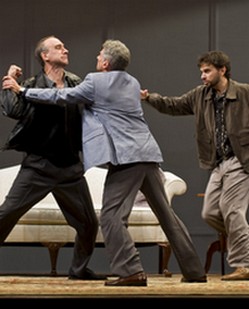
Michael Countryman, David Garrison and Brian Avers
(Photo by Kevin Sprague)
|
While God of Carnage played long enough to install a second cast and will no doubt enjoy many future productions, Reza's biggest hit is unquestionably Art, about a comfortable three-way male friendship that explodes hilariously when one of the men indulges his penchant for connoiseurship with the acquisition of an extremely costly labstract painting. As Serge, one of the play's three forty-something Parisians, feels his white-on-white canvas is not as devoid of line, color and artistic meaning, so audiences may see this as not just an amusing 90-minute entertainment, but a thoughtful exploration of the complex art of friendship
It is this duality that imparts just enough substance to an essentially light, slight play to make the time and money spent worthwhile that has made Art a global super-hit — translated into over 30 languages and performed by dozens of acting trios since its Paris premiere in 1994. The trendy shock-snob appeal of abstract minimalism was already passé when I saw Art on Broadway in 1998, but the script's wit and slight-but-substantial appeal was not. And as anyone attending Barrington Stage's current revival ill agree, neither have the intervening years dulled Art's comic edge.
Reza's sharp, amusing dialogue with lots of room for meaningful pauses and body language makes Art an actor's dream script and there have been enough dream trios to entice audiences for another visit with Serge, Marc and Yvan. Alan Alda, Victor Garber and Alfred Molina of the Broadway production certainly rank high in my memory book — especially, Molina who I encountered for the first time as the endearingly manic Yvan' and who more recently mesmerized in a quite different role and play about art, John Logan's Red (review).
I arrived at Barrington's Main Stage almost envying those who would be seeing Art without memories of previous performances. But no worries about unfavorable comparisons necessary. Director Wishcamper has assembled a stellar threesome and design team. And so while I anticipated the current Yvan's bravura monologue and knew how things would end, the artfulness of Art once again kicked in. It's not Shakespeare but the watchability factor is strong as ever -- especially given the fun of watching this latest group of friends get more and more testy over that fourth character — the oddly emotion arousing white-on-white canvas that triggers their quarrel.
The brouhaha over the painting plays out on Robin Vest's handsome unit set which establishes the move from one friend's apartment to another only by a change in the art work on display (Serge's trouble causing white canvas rests mostly on a chair since he still hasn't settled on the perfect wall space, Marc's living room wall sports a less costly but very realistic landscape and at Yvan's the wall sports a decidedly provenance-less piece described by one of the others as "motel art").
Once Serge proudly displays his new acquisition, the problems it kicks up are revealed through the various confidences addressed to the audiences and shifting alliances revealed by a different pair of friends discussing the third. As it turns out Marc's problem with the white canvas is less with his being nonplussed by the painting but by the value that Serge places on it which somehow makes him feel betrayed. Serge's problem is that he's unable to respond with nonchalant lightness to Marc's disparaging remark about something in which he has made a big emotional and financial investment. ("You paid two hundred thousand francs for this shit?")
As for the youngest and least self-confident and successful of the friends (Serge is a dermatologist, Mark an aeronautical engineer while Yvan is embarked on a new sales career with the uncle of the woman he's about to marry), his problem is that he cannot bear to see his two friends argue and even come to blows. He therefore tends to side with whichever of the other two he happens to be with
. All of this plays out as the sort of intellectual debate that sounds more profound than it is and that has to be seen to understand why Garrison's smooth-tongued yet vulnerable Serge, Countryman's outspoken Marc and Avers' easily discombobulated Yvan are so deliciously well-matched, funny; and, to find them touching and likeable because of the way, despite all the cultural lingo, they inevitably explain themselves with honesty.
The pleasures of the men's performances comes as much from the small things like the pause between arguments when the actors silently nibble on olives. On a grander scale, there's Yvan's operatic comic aria in which he rants about his increasingly catastrophic wedding plans, complete with assuming the voices of the various mothers and stepmothers involved.
As I thought when I reviewed Art the first time, if Seneca were actually present at this fast-paced battle of words, instead of just as a book Serge uses as a weapon to bolster his opnions, he'd quote himself with "What fools these mortals be?" As for whether these fools park their differences and save their 15-year friendship, I'm only going to tell you that Reza has concocted a somewhat deeper-than-expected and definitely surprising finale. In short, the end lives up to the stylish beginning. And while I'd rather own even the smallest Degas or Picasso canvas in the brilliant Picasso Looks At Degas exhibit currently on display in the Clark Museum in Williamstown than Serge's white canvas, Art holds its value as a smart terrifically entertaining play and acting tour-de-force.
Production Notes
July 22 ~ August 7
Art by Yasmina Reza
Translation by Christopher Hampton
Director- Henry Wishcamper
Cast: Brian Avers (Yvan), Michael Countryman (Marc), David Garrison (Serge).
Scenic designer: Robin Vest
Costume designer: Jenny Mannis
Lighting designer: Matt hewRichards
Sound designer: Bart Fasbender
Stage Manager: Wesley Apfel
Reviewed by Elyse Sommer at July 25th press opening
Sweeney Todd The Demon Barber of Fleet Street- A Musical Thriller
| He saw how civilized men behave He never forgot, he never forgave — The Ensemble on the vengeful Sweeney Todd. |
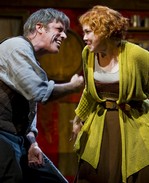
Jeff McCarthy and Harriet Harris
(Photo: Kevin Sprague) |
Boyd has demonstrated her love and understanding of Sondheim's music and lyrics with stagings of some of his best known works. Her summer 2000 revival of Follies brought a steady stream of my New York colleagues to the Berkshires. This is another not to be missed show that critics and musical theater devotees everywhere will want to see.
For starters, it has one of the best ever Sweeney Todds in Jeff McCarthy (Berkshirites will remember him from Mack and Mabel, and Follies; Broadway theater goers from Urinetown). McCarthy brings good looks and an extaordinaly strong and rich singing voice and riveting presence to the Demon Barbor who "never forgot and never forgave" his unjust imprisonment. Oxymoronic as it may sound, he is a charismatic Todd, managing to convey his metamorphosis from a tender and devoted husband into an insanely vengeful man who can slit an unwitting customer's throat with calm efficiency. No wonder that Mrs. Lovett, the baker who in Act One sings about hers being "The Worst Pies in London" hankers for more from him than the ghastly but best-selling pie fillings he provides her with.
As for the crafty and romantically inclined Mrs. Lovett, Harriet Harris brings her considerable comic skills to the part. While not quite on a par with Angela Lansbury in the singing department, Harris delivers enough of a Lansbury-like persona to be a delightfully deceitful and wicked accomplice for carrying out the gory doings of this Grand Guignol musical melodrama.
The cast overall is terrifically satisfying in terms of acting and singing: Ed Dixon is a fine lecherous Judge Turpin, The embattled romantic couple have especially rich voices, and are appropriately winning — Shonn Wiley as Anthony , the sailor with whom Todd returns to London; and Sarah Stevens as Todd's daughter Johanna who, as Turpin's ward, has replaced her mother as the object of his lustful intentions. Timothy Shew is convincing and musically pitch perfect as Beadle BraMford, as are Branche Woodman as Pirelli, Zachary Clause as the Dickensian Tobias Ragg and Christiane Tisdale as the Beggar Woman to whom Todd should have paid closer attention. Outstanding is an understatement for the nine member Ensemble that pops up throughout the two and a half hours (plus intermission) that fly by without a single dull spot.
Sweeney Todd brilliantly illustrates how Stephen Sondheim attuned musical theater audiences to dark stories with complex scores that were gorgeously, operatically melodic even though not stick in the ear show tune hummers. It laid the groundwork for innovative new works like the Pulitzer Prize winning Next to Normal, about a family dealing with mental illness (review). The operatic plot and music sensibility notwithstanding, Sweeney Todd's appeal is universal. Like Alexander Dumas' and Victor Hugo's tales, it draws you into the eerie world of days gone by on stage and respond viscerally to the frequently overlapping solos, duets and ensemble sequences.
My last encounter with Sweeney Todd was British director John Doyle's minimalist, multi-tasking version in which the performers acted and sang and also played the instruments usually handled by an orchestra ( review). The stellar cast brought off this Intriguing concept magnificently. However, it's wonderful to see a production that, though also with a relatively small cast, comes closer physically to the 1979 original — but much more intimately so. The Pittsfield venue on Union Street that has now been Barrington Stage's home for five years is large by Berkshire standards: 500 seats-- minus 2 rows removed for this production to accommodate an added playing area down stage from the pit orchestra.
Wilson Chin's set with its catwalks and roll out pie and barber shop accommodates the various locations beautifull. Yes, there's a furnace for those grisly pies, and it's all atmospherically lit by Philip S. Rosenberg's. Jen Moeller' has outfitted the cast in an aptly dark-hued palette, with some eye-popping splashes of brightness via Pirelli's suit and the newly prosperous Mrs. Lovett's outfit.
Ms. Boyd's long time musical director Darren Cohen does full justice to the nuances of the score with a larger than usual orchestra. It's a joy to hear the singers' voices without the hollow, over-amplifed sound that's become all too typical for musicals presented on Broadway or at huge touring theaters. If I attached star ratings to my reviews, I'd certainly give this Sweeney Todd the highest number of stars.
For anyone needing a plot synopsis: The play's villain, Judge Turpin exiled Todd to Australia for fifteen years because he wanted Todd's lovely wife for himself. The play begins as the wronged husband returns to London disguised as Sweeney Todd. On hearing that his wife killed herself and his daughter Johanna has become the ward of the evil (and still lustful) Judge, Sweeney bitterness turns totally toxic. He finally gets his enemy into the barber chair turned guillotine but, this being a melodrama, the barber is doomed to even greater grief when he learns that Mrs. Lovett has deceived him about the fate of his wife.
Production Notes
\ Sweeney Todd The Demon Barber of Fleet Street, A Musical Thriller
Music and Lyrics by Stephen Sondheim
Book by Hugh Wheeler, From an adaptation by Christopher Bond
Directed by Julianne Boyd
Cast (in order of appearance): Shonn Wiley (Anthony Hope), Jeff McCarthy (Sweeney Todd), Christianne Tisdale (Beggar Woman), Harriet Harris (Mrs. Lovett), Ed Dixon (Judge Turpin), Timothy Shew (Beadle Bamford), Sarah Stevens (Johanna Barker), Zachary Clause (Tobias Ragg) Branch Woodman (Pirelli), Allan Snyder (Jonas Fogg, Ensemble); Ensemble: Traci Bair, Paul Betz, Analisa Leaming, Alisa May, John Rapson, Jamie Rosenstein, Amanda Salvatore, Billy Shaw Scenic Designer: Wilson Chin
Costume Designer: Jen Moeller
Lighting Designer: Philip S. Rosenberg
Sound Designer: Ed Chapman
Musical Direction: Darren Cohen
Choreography: Shonn Wiley
Wig Designer: Dave Bova
Stage Manager Renee Lutz
On the Main Stage from June 17 - July 17
Running Time: 2 hours 45 minutes with one intermission.
Reviewed by Elyse Sommer at June 23rd Press Opening
|
Musical Numbers
| |
Act One
|
Act Two
|
The Whipping Man
| I can't square anything I don't understand. It ain't ours to square. That's why we always asking . . . sometimes you didn't get answers that you liked. But you kept on asking. That's what a Jew is. We talk with God, we wrestle with him. Sometimes we even argue with Him. We never stop asking, looking, hoping for answers. You don't lose your faith by not getting answers. You lose your faith by not asking questions. . .— Simon
|
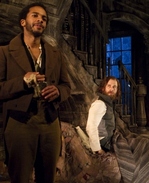
Clarke Peters and Nick Westrate
(Photo: Kevin Sprague) |
This is serious, tense and, at times, hard to watch stuff, but like any good drama it's filled with moments of humor. Christopher Innvar, hanging up the actor's hat to make his directing debut, has given Lopez's story a lovely, well paced production and drawn superb performances from the 3-member cast.
The events that jump start the plot are based on historic fact: The exodus of property owners to safer areas after the Confederacy's surrender at Appotomax left Richmond a burnt out wasteland of deserted, looted homes— are based on historic fact. Southern Jews, happy to have found acceptance and prosperity in places like Richmond, were indeed extremely patriotic and joined the Confederate Army in large numbers. Some of them did indeed own slaves, though mostly as household servants since Jews tended to live in urban homes and not on plantations. Whether these Jewish slave owners trained their slaves to practice their religion, as the predominantly Christian slaveholders did is more based on hearsay than fact according to an interview with Lopez by Pam Kragen (North County Tmes, May 5, 2010) prior to the play's recent opening at San Diego's Old Glob. But those rumors about Jewish slaves and the fact that the surrender at Appotomax from April 7-9, 1965 came just days before the first day of Passover was all that was needed to ignite a fire in Lopez's vivid imagination.
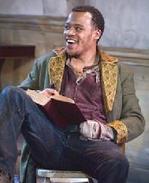
LeRoy McClain (Photo: Kevin Sprague) |
The house is stripped bare of what was no doubt its former splendor and everyone except two of the newly emancipated DeLeon slaves. First on stage is the devoted and devout family retainer, Simon (Clarke Peters). No sooner has Caleb collapsed and we realize the seriousness of his wound than John LeRoy McClain), a much younger former slave who grew up as Caleb's playmate, arrives. Unlike Simon, who symbolizes all men of peace who are less interested in avenging past wrongs than doing the right thing, John is less law abiding and, above all, more gleeful than grateful about his new freedom. He's less likely than Simon to overlook the hypocrisy of observant Jews like Caleb and his family owning slaves. To add to both young men's issues about their Jewish identities, it turns out that each is hiding a secret that must be unraveled by the end of the twisty two hours.
Director Innvar has drawn rich, character defining performances from these three men trying to grab hold of a way to find their way in a world as shattered as Caleb's leg. Clarke Peters is quietly majestic as the older black man who is willing to serve his former master as a free man. The eloquence of this illiterate man does stretch credibility but Peters is dynamic enough to make it work, and he has you hoping that his faith will sustain him once a devastating secret known only to Caleb and John comes to light.
LeRoy McClain's John is a seething cauldron of barely contained rage. He manages to be cocky, yet painfuly vulnerable. To play the young master of the ruined mansion, Mr. Innvar has brought aboard Nick Westrate, his acting colleague from the successful recent Off-Broadway revival of The Boys in the Band. Westrate, unfazed by having to spend most of the play reclining on a bare floor or pillows, impressively taps into Caleb's emotional and physical pain. His being able to sit up and talk quite sanely after all the liquor he ingests to endure Simon's surgical procedure on his leg again calls for a suspension of disbelief. In fact, anyone losing all that blood would almost surely die if this wasn't a play.
Sandra Goldmark, another Innvar colleague from The Boys In the Band (review) proves as adept at creating the right scenery for Barrington Stage's small theater as for a large site specific modern loft. She allows the grim totally bare set to become just a little bit more lived in as a result of John's various trips to "liberate" chairs and dishes and clothes from other deserted houses. Even when no longer quite so bare, the aura of grimness prevails.
The Whipping Man of the title became the evil ghost overarching the play as a result of the playwright's research into the lives of slaves. As he explained in the above mentioned interview " In an urban environment {as opposed to a large plantation with no neighbors within earshot} you wouldn't want your neighbors to overhear your slaves screaming when they're being whipped. So in many Southern towns, there would be a man you would outsource your whippings to and he would earn a very nice living."
By the time we understand each of the three men's relationship to the Whipping Man, and with each other we know that the questions that are part of their strange but incredibly moving ritual Seder are answered only by more questions about how we do what we do, deal with the hand dealt to us, and rationalize injustice. It all adds up to a theatrical experience that's as potently entertaining as it is profound, proof positive that summer theater has come a long way from Judy and Mickey's putting on a song and dance show in the barn. Not that we've abandoned musical fare, but even there the choices tend towards substantial fare: to wit, Barrington artistic director Julianne Boyd's first of the season musicals at the company's main stage not a light revue but Stephen Sondheim's dark masterpieces, Sweeney Todd.
Production Notes:
The Whipping Man By Matthew Lopez
Directed by Christopher Innvar
Cast: LeRoy McClain (John), Clarke Peters (Simon), Nick Westrate (Caleb)
Scenic design: Sandra Goldmark
Costume design: Kristina Lucka
Lighting design: Scott Pinkney
Sound design: Brad Berridge
Stage Manager:Kate J. Cudworth
May 26, 2010 - June 17, 2010
Performances: Tuesday through Friday at 7:30pm, Wednesdays at 2pm, Saturdays at 4pm and 8pm, Sundays at 7:30pm
Tickets: $15-$45
Recommended for ages 12+
Reviewed by Elyse Sommer at June 29th press opening
Freud's Last Session
| You think shame is a good thing?— Freud I'd love to see more of it! Admitting to bad behavior doesn't excuse it.— Lewis If only we had met years ago! I would have listened to my patient's sins, then told them to fall to their knees and beg absolution. Psychoanalysis doesn't profess the arrogance of religion, thank God.—Freud |
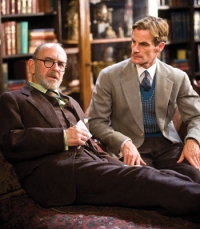
Mark H. Dold and, on couch, Martin Rayner
(Photo: Kevin Sprague) |
| This 2-hander was extended again and again last summer and became Barrington Stage's longest running Second Stage production. This summer the show and its cast returns for just one week from June 22 through July 3 . Then it's on for an Off-Broadway run at the Marjorie S. Deane Little Theatre ( 5 West 63rd Street ) beginning July 9, with an opening scheduled for July 22. Below our review from last summer. -- e.s. |
Now that I've seen Freud's Last Session instead of just hearing about it, I can see why it's been this season's big little hit, despite essentially being a debate between an atheist and a devout Christian. The atheist, Dr. Sigmund Freud, needs no introduction unless you've been in a long, deep Rip Van Winkle-like sleep, but the name C. S. Lewis might not be as instantly familiar even though his children's books (The Narnia Chronicles, The Screwtape Letters and The Lion, the Witch and the Wardrobe) became international best sellers and his writings on Christianity gained influence among religious scholars. At the time of his imagined encounter with Freud, he was still just an up and coming academic, and at forty-one, half Freud's age.
As portrayed by Dold and Rayner, both Lewis and Freud are enormously engaging and often quite funny. Freud's ironic humor pops up almost instantly as he respond's to Lewis' apology about being late with "if I wasn't eighty-three I would say it doesn't matter" and when he describes his dog as his "emotional barometer, " and explains that "if a patient is calm, he stretches out at my feet. But if a patient is agitated, Jo-Fi stands at my side and never takes his eyes off him." Lewis, who expected hostility for having publicly disparaged Freud's work, humorously declares that he is nevertheless an admirer: "Your writings are always thought provoking. When I was a student in University we devoured every book to discover our latest perversions. . . then competed to invent worse." Above all, both come off as terrifically human.
It's almost unavoidable for this sort of discussion play to bea static, talking heads experience, but director Tyler Marchant sees to it that this is kept to a minimum. Marchant is aided in doing so by the inherent drama in the fact that the meeting takes place at the beginning of World War II. Thus, the constant threat of bombings makes gas masks an added accessory of Lewis's attire and on Freud's Greek and Roman artefact cluttered desk. There are also opportunities to add dramatic interruptions from the war visited on Freud by the painful cancer. To add to this intermissionless 75-minute play's assets is the fact that St. Germain has smartly enriched his inspirational source, a book The Question of God by Dr. Armand M. Nicholi Jr., with words from his protagonists' own published writings.
While both men remain firmly committed to their views, the author remains admirably impartial so that whatever your own beliefs they'll be intact when you leave the theater. The intermittent assaults of the cancer on Freud's ruined jaw give Rayner the more emotionally fraught role. However, as Dold's Lewis doesn't let youth or a certain awe of the more famous man into whose sanctuary he's been admitted intimidate him from firmly defending his beliefs— and on occasion doing so with slyly amusing aggression. His obvious sympathy for Freud's suffering, speaks more positively for his Christianity than anything said. Having previously displayed his ability to add star quality to support roles (as the thoughtless to more sympathetic Count in Cyrano de Bergerac and the drolly uptight Victor in Private Lives—- both at Barrington Stage) it's nice to see Dold get co-star billing. Perhaps next year Barrington Stage Artistic Director Julianne Boyd will find a vehicle in which he can star on the main stage (actually he would have been an interesting Stanley in the current A Streetcar Name Desire.
Judging from the performance I attended I'm not the only one playing catchup. This second coming of Freud's Last Session is a sell out. It's a talky little engine that could — but the talk is consistently interesting.
Production Notes
Freud's Last Session
by Mark St. Germain
Suggested by "The Question of God" by Dr. Armand M. Nicholi, Jr.
Directed by Tyler Marchant
Cast: Mark H. Dold as C.S. Lewis and Martin Rayner as Sigmund Freud
Set: Brian Prather
Lights: Clifton Taylor
Costumes: Mark Mariani
Sound: Beth Lake
Stage Manager: Kate J. Cudworth
Running Time: Approx. 75 minutes without intermission
Reviewed by Elyse Sommer 8/19/09


